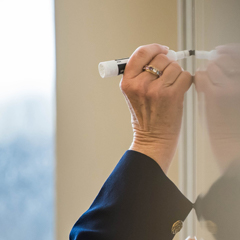La Salle University
Spring courses at La Salle offer students perspectives on inclusivity

As an academic community, La Salle University is committed to providing students with a curriculum that integrates the principles of diversity, equity, and inclusion.
A number of courses offered in the Spring 2021 semester, across many disciplines, explore issues of race and ethnicity, bias, privilege, sexual orientation, gender identity and expression, immigration, poverty, and more. The disproportionate impact of environmental injustices on communities of color, the systemic racism informing U.S. housing policies, and the manner in which different religions react to sexism and global crises are among the topics students will explore in depth in these classes.
“By examining these important contemporary sociocultural issues in various contexts, La Salle students are challenged to see the world through the eyes of others,” said Steven F. Siconolfi, Ph.D., interim provost and vice president of academic affairs at La Salle, “and they can engage the Lasallian values of tolerance, empathy, and respect for all in every aspect of life.
Here is a sampling of classes being offered this spring that incorporate diversity, equity, and inclusion into their respective curriculum. (Students can register for these classes through Monday, Jan. 25.)
Advanced Interpersonal Communication (COM 315)
Katie Dunleavy, Ph.D.
Associate Professor, Communication
Through reading and reflection, students will assess their interpersonal communication skills in a course that integrates LGBTQ+, interracial, and interethnic relationships. Students explore interpersonal programs of research, such as forgiveness, jealousy, distance relationships, and bullying.
Communication and Sport (COM 255)
Katie Dunleavy, Ph.D.
This course examines how sports are impacted by interpersonal communication, group communication, organizational communication, and mass media. Race in athletics is examined along with other areas of focus such as family communication and sport, the concept of identity in sport, coach-athlete communication, team communication, and cultural views of sports.
Dynamic of People in Diverse Environments (SWK 281)
Rosemary Barbera, Ph.D.
Associate Professor, Social Work
Chair and Program Director, Social Work
This course examines the foundational aspect of social work, focusing on people as members of groups, organizations, communities, and global society, and addressing issues such as discrimination, microaggressions and structural oppression. Also of emphasis is the social work profession’s ethical responsibility for advancing social, economic, and environmental justice.
 Dynamics of Race and Ethnicity in Contemporary Societies (SOC 262)
Dynamics of Race and Ethnicity in Contemporary Societies (SOC 262)
Charles Gallagher, Ph.D.
Professor and Chair, Departments of Sociology and Criminal Justice
Why are recent arrivals from certain parts of Asia almost five times as likely as whites to live below the poverty line? Why are African-Americans about three times as likely as whites to live below the poverty line? These are among the issues examined in this course, which explores the sociology of racial, ethnic, and cultural groups in the United States, focusing on how these groups and inequality intersect.
Ethics and the Good Life (PHL 152)
Whitney Howell, Ph.D.
Associate Professor, Philosophy
Students will spend a portion of this class consider how Aristotle’s ideas may inform criticism of political communities that have failed their citizens by making it more difficult for them to live a good life. Specifically, students will read about the history of racist housing policies in the U.S. and the proposal of reparations as a means of addressing this injustice and its enduring legacy.
Global History From 1500 to the Present (HIS 251)
Charles Desnoyers, Ph.D.
Professor, History
Issues of political, social, and economic freedom are the focus of this course, designed to give students a greater understanding of the relationships among modern nations that are necessary in today’s shrinking globe. Equity, racism, the legacy of colonialism, and the position of women globally are examined in their historical and present-day context.
Intercultural Communication (COM 220)
Katie Dunleavy, Ph.D.
This course examines historical patterns that influence values, beliefs, and behaviors within cultural groups, and how these issues influence communication. A particular focus is placed on increasing knowledge and skills to improve communication between races and other ethnic and cultural groups.
Introduction to Environmental Science (ENV 153)
Florence Ling, Ph.D.
Assistant Professor, Environmental Science
Students will learn about environmental injustice in water availability and urban lead contamination by looking at the impact of climate change on water availability in certain parts of the world, and lead contamination levels on communities of color.
Latin American Art (ARTH 224)
Mey-Yen Moriuchi, Ph.D.
Associate Professor, Art History
Students analyze and distinguish the social, historical, and cultural aspects of works of Latin American art, in order to develop global and cultural awareness of decolonizing perspectives. This course addresses issues that are critical to discussions of the arts of Latin America, such as racial mixing, the formation of racial, social, and national identities, and the adaptation and transformation of western cultures.
 Philosophy Explores Photography (PHL 260)
Philosophy Explores Photography (PHL 260)
Cornelia Tsakiridou, Ph.D.
Professor, Philosophy; Director, Diplomat-in-Residence Program
Racial and ethnocentric aspects of American photography are examined in a historical context in this course, including anti-Semitism, xenophobia, wartime propaganda, and how the Civil Rights Movement was documented. This course also delves into the exploitation of the female body in advertising.
Race, Ethnicity and Public Health (PHLT 489)
John G. Taylor, M.Ed.
Professor, Public Health
This course focuses on the racial and ethnic influences on personal health and the societal factors that shape them. Students will define and describe racial and ethnic health inequities and examine the underlying mechanisms behind them and approaches for the elimination of those disparities.
Religion Matters (REL 100)
Maureen O’Connell, Ph.D.
Associate Professor, Religion
This course explores the ways in which Buddhism, Judaism, Christianity, Navajo religion, and Islam are responding to current issues like racial injustice, COVID-19, and sexism. Students investigate both the aspects of religion that matter in their lives as well as religion’s impact on society.
—Patrick Berkery